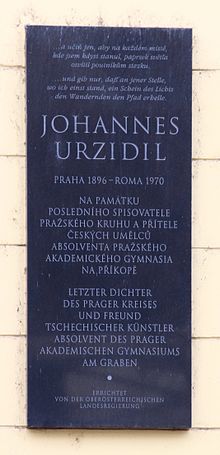Johannes Urzidil
You can help expand this article with text translated from the corresponding article in German. (June 2011) Click [show] for important translation instructions.
|

Johannes Urzidil (3 February 1896 in Prague – 2 November 1970 in Rome) was a German-Bohemian writer, poet and historian. His father was a German Bohemian and his mother was Jewish.
Life
Urzidil was educated in
embassy
in Prague.
When
citizenship
in 1946.
Urzidil died in Rome in 1970.
Works
Although he published poetry, Urzidil is best known for his
Camberwell beauty) about Adalbert Stifter′s youth, and his collections of short stories like The Lost Beloved (1956; the title refers as well to Prague which he had to leave behind when the Nazis occupied Czechoslovakia as to his first love), Prague Triptych (1960, whose composition is derived from that of an altarpiece), or Kidnapping and Seven Other Incidents (1964, whose eight stories are situated in the USA). Urzidil's only novel The Great Hallelujah (1959) shows as literary collage in the tradition of John Dos Passos, Thomas Wolfe, and Alfred Döblin
a manifold panorama of the United States as he experienced them since his arrival in 1941.
He wrote also books and essays about cultural history, e. g. The Fortune of Presence. , the companion of Urzidil's life-saver Bryher.
Awards
Urzidil won a number of prizes in his career, including the Charles Veillon Prize (1957) and the Großer Österreichischer Staatspreis (1964).
Legacy
The
70679 Urzidil
is named after Urzidil.
References
External links
- Guide to the Papers of Johannes and Gertrude Urzidil at Leo Baeck Institute, New York(in English)
- Website of the Johannes Urzidil Society, with detailed biography, bibliography etc. (in Czech)
- Website about Urzidil by the Urzidil researchers Klaus Johann and Vera Schneider, with detailed bibliography of secondary literature, annotated collection of links, news about Urzidil and his work, and much more information (in German)
- Athalia Montez, Advice (1964), an American story by Urzidil, translated into English by David Burnett (in English)
- Detailed Biography Archived 2017-12-11 at the Wayback Machine by Klaus Johann at www.exil-archiv.de (in German)
- Prague author Johannes Urzidil remembered 40 years after his death by Rob Cameron for Radio Prague (in English)
- The Fictional Country You Build When Your Home No Longer Exists, comprehensive article about Urzidil by James Reith in The Atlantic (in English)
- About the word hinternational, coined by Urzidil - an essay by Djelal Kadir in World Literature Today (in English)
